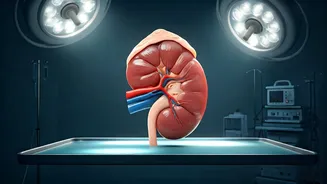Introduction: Kidney Concerns
The kidneys, essential organs, filter waste and toxins from the blood. Their optimal functioning is vital for overall health. However, some daily practices,
especially those performed in the morning, can unknowingly inflict harm. Experts point out that the morning routine could unintentionally include practices that impair kidney function. The consequences of neglecting kidney health can be severe, extending beyond immediate discomfort to long-term chronic ailments. Recognizing these risks is the first step toward safeguarding kidney health and ensuring long-term wellness. Acknowledging the connection between daily habits and kidney health helps to create a proactive approach to well-being, emphasizing the importance of informed choices and preventive measures to promote optimal renal function.
Skipping Morning Hydration
One of the most concerning habits is not drinking water upon waking. Dehydration, especially after a night's sleep, can strain the kidneys. During sleep, the body loses fluids, and not replenishing them first thing in the morning reduces blood flow to the kidneys. Reduced blood flow impairs kidney function, leading to potential damage. Adequate hydration is critical for the kidneys to flush out waste products and maintain their filtering efficiency. A morning glass of water is a simple yet impactful act, assisting in rehydration and promoting healthy kidney function. Making sure that the body receives adequate hydration supports the kidneys and overall well-being. It is recommended to hydrate as soon as you wake up to provide the kidney the necessary assistance.
Empty Stomach Painkillers
Taking painkillers on an empty stomach is another risky morning habit. Many common painkillers, especially nonsteroidal anti-inflammatory drugs (NSAIDs), can be harsh on the kidneys. Without food, these drugs are absorbed faster, potentially causing direct damage to the kidney tissues and reducing blood flow. Repeated use of painkillers, even at recommended doses, poses a risk, particularly for those with pre-existing kidney issues. This habit often leads to kidney problems as time goes on. It is important to always consume food when taking painkillers and follow the advice of a healthcare professional. Ensuring the stomach has food to protect the kidneys is key in daily life.
Excessive Caffeine Intake
Starting the day with large amounts of caffeine can also affect kidney health. Caffeine is a diuretic, which means it increases urine production, potentially leading to dehydration. Furthermore, excessive caffeine can elevate blood pressure, putting additional stress on the kidneys. Regular high caffeine intake can impair kidney function and can also result in long-term problems. Moderation is important; balancing caffeine consumption with adequate water intake can mitigate some of these risks. Being aware of caffeine’s diuretic effects and its potential to raise blood pressure is crucial for protecting kidney health. Monitoring caffeine intake and overall daily intake should be done to prevent issues.
Ignoring Morning Urges
Holding urine for extended periods, a common morning habit for many, is a significant risk factor for kidney health. This practice puts pressure on the bladder, which can back up into the kidneys. This backflow can cause kidney damage and increase the risk of infections. Ignoring the urge to urinate not only strains the kidneys but can also lead to bladder issues and potentially serious kidney complications. It's essential to listen to the body's signals and empty the bladder promptly. This simple step can prevent complications and promotes the smooth functioning of the kidneys and bladder. Practicing this habit can ensure healthy kidney function.
Unhealthy Breakfast Choices
Finally, the type of breakfast consumed can impact kidney health. Consuming high amounts of processed foods, salt, and sugar can contribute to kidney damage. These foods can cause high blood pressure, increase the workload on the kidneys, and can lead to kidney-related issues. A breakfast full of salt will increase blood pressure. A healthy breakfast should include balanced nutrition with lots of fruits and vegetables. Choosing a healthy breakfast supports overall well-being and prevents a multitude of kidney diseases. Making sure that breakfast is low in sodium, processed foods, and sugar is necessary.





















